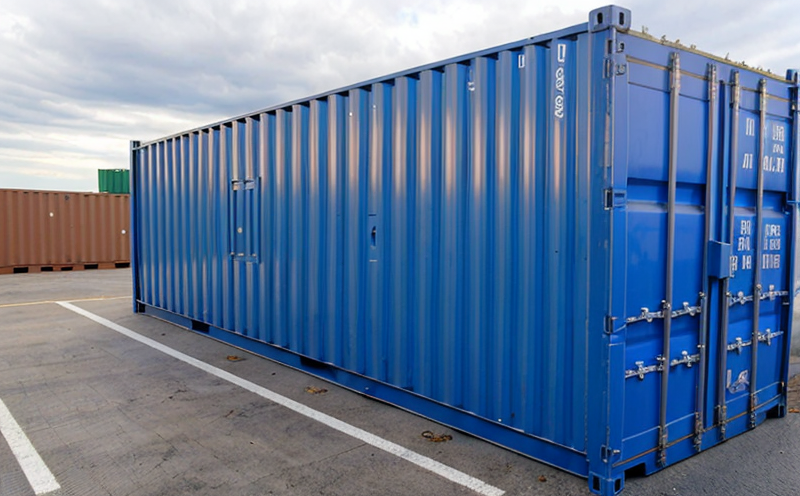ASTM E1530 Thermal Conductivity Testing of Plastic Storage Plastics
The thermal conductivity of plastic storage containers is a critical property that affects their performance in various environments. ASTM E1530 provides standardized methods for determining the steady-state one-dimensional heat flux through flat specimens of materials under controlled conditions. This test evaluates how efficiently different types of plastic storage containers transfer or insulate against heat, which is essential for ensuring product safety and reliability.
The procedure involves measuring the temperature difference between the hot and cold sides of a sample placed in a thermal conductivity apparatus. The specimen must be prepared carefully according to ASTM E1530 requirements; typically, it should have flat surfaces with dimensions specified by the standard. The test setup includes a heater or cooler on one side of the specimen and a thermocouple on the other.
The measured temperature gradient across the sample is used to calculate its thermal conductivity using Fourier's Law: q = -k * dT/dx, where q is the heat flux, k is the thermal conductivity, dT is the temperature difference, and dx is the distance between the two points. Understanding these values helps engineers design more efficient packaging solutions for food storage or pharmaceuticals transport.
This testing method can reveal important information about a material’s ability to either retain or dissipate heat efficiently. For instance, insulating materials like polyethylene (PE) generally have lower thermal conductivities compared to metals. On the other hand, certain types of plastic containers used for food packaging require good thermal conductivity so they cool down quickly after being exposed to hot liquids.
Accurate measurement is crucial because even small differences in thermal performance can lead to significant issues during manufacturing or use. A laboratory adhering strictly to ASTM E1530 ensures consistent results across multiple samples, making it easier for manufacturers to compare their products against industry benchmarks.
In summary, ASTM E1530 plays a vital role in assessing the suitability of plastic storage containers by evaluating their thermal properties quantitatively. By following this standard procedure, laboratories like Eurolab provide reliable data that helps companies make informed decisions about material selection and design improvements.
Benefits
Conducting ASTM E1530 testing offers numerous advantages for manufacturers and quality control departments involved in producing plastic storage containers. One key benefit is improved product performance, which translates directly into customer satisfaction and loyalty. Understanding the exact thermal properties of a particular plastic type allows companies to optimize designs for specific applications, whether it's enhancing insulation capabilities or improving heat dissipation.
Another advantage lies in regulatory compliance. Many industries have strict regulations regarding temperature control during storage and transport. By ensuring their products meet these standards through rigorous testing according to ASTM E1530 guidelines, businesses can avoid costly fines and potential recalls. This also builds trust with customers who value safety and reliability.
Furthermore, this type of testing supports continuous improvement efforts within R&D teams. Continuous monitoring allows for identifying trends over time or detecting unexpected changes in materials performance. Such insights enable proactive adjustments to formulations or processing techniques, ultimately leading to better products at lower costs.
The data generated from ASTM E1530 tests provides valuable input during procurement processes too. Suppliers can be assessed based on their ability to consistently produce high-quality raw materials that meet the desired specifications. This helps ensure long-term partnerships with reliable vendors who share similar quality standards.
Eurolab Advantages
At Eurolab, we specialize in providing comprehensive testing services for all aspects of plastic storage containers. Our team of experts has extensive experience working directly with industry leaders to ensure they receive accurate and reliable results every time. Here are some reasons why choosing Eurolab for ASTM E1530 thermal conductivity tests is the best choice:
Accurate Results: Using state-of-the-art equipment calibrated according to international standards ensures precise measurements. Our labs are equipped with the latest technology including high-precision thermocouples and robust heating systems that guarantee consistent testing conditions.
Dedicated Expertise: Our staff comprises highly skilled professionals trained specifically in conducting ASTM E1530 tests. They stay updated on any changes or updates to the standard, ensuring compliance with current requirements.
Comprehensive Reporting: Beyond just numerical values, our reports include detailed descriptions of test procedures and findings, along with recommendations for further actions if necessary. This comprehensive approach helps clients fully understand the implications of their results.
Timely Delivery: Recognizing the importance of timely feedback in business operations, Eurolab prioritizes quick turnaround times without compromising on quality. Clients often receive their reports within days of submitting samples.
Cost Efficiency: By offering competitive pricing packages tailored to individual needs, we help reduce overall testing costs while maintaining high standards of service.
Use Cases and Application Examples
The results from ASTM E1530 thermal conductivity tests have wide-ranging applications across various sectors. Here are some examples illustrating how this information is used:
Pharmaceutical Industry: Ensuring that medicines stored in plastic containers do not degrade due to excessive heat exposure requires accurate knowledge of container materials' thermal properties.
Food Packaging Sector: Testing ensures that packaging keeps perishable items fresh by effectively managing temperature fluctuations during transportation and storage.
Aerospace & Defense Manufacturing: Lightweight yet thermally efficient containers are crucial for maintaining optimal temperatures in space vehicles or military equipment.
Petrochemical Industry: Proper insulation of tanks storing volatile chemicals helps prevent accidents caused by improper heat management.
Consumer Goods: Designing attractive yet functional beverage coolers necessitates understanding how different plastics behave under varying temperature conditions.
These diverse use cases demonstrate the versatility and importance of ASTM E1530 testing in ensuring product quality, safety, and compliance across industries.





